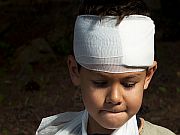- 10 Strategies to Overcome Insomnia
- Could Artificial Sweeteners Be Aging the Brain Faster?
- Techniques for Soothing Your Nervous System
- Does the Water in Your House Smell Funny? Here’s Why
- Can a Daily Dose of Apple Cider Vinegar Actually Aid Weight Loss?
- 6 Health Beverages That Can Actually Spike Your Blood Sugar
- Treatment Options for Social Anxiety Disorder
- Understanding the Connection Between Anxiety and Depression
- How Daily Prunes Can Influence Cholesterol and Inflammation
- When to Take B12 for Better Absorption and Energy
Head Injury Tied to Long-Term Attention Issues in Kids


Children who suffer even mild brain injuries may experience momentary lapses in attention long after their accident, new research finds.
The study of 6- to 13-year-olds found these attention lapses led to lower behavior and intelligence ratings by their parents and teachers.
“Parents, teachers and doctors should be aware that attention impairment after traumatic brain injury can manifest as very short lapses in focus, causing children to be slower,” said study researcher Marsh Konigs, a doctoral candidate at VU University Amsterdam in the Netherlands.
This loss of focus was apparent even when scans showed no obvious brain damage, the researchers said.
Traumatic brain injury can occur from a blow to the head caused by a fall, traffic accident, assault or sports injury. Concussion is one type of traumatic brain injury. In 2009, more than 248,000 teens and children were treated in U.S. emergency rooms for sports- and recreation-related traumatic brain injuries or concussions, according to the U.S. Centers for Disease Control and Prevention.
For the study, published online Aug. 3 in the journal Pediatrics, researchers compared 113 children who had been hospitalized with a traumatic brain injury with 53 children who had a trauma injury not involving the head. The injuries, which ranged from mild to severe, occurred more than 18 months earlier on average.
The researchers tested mental functioning and evaluated questionnaires completed by parents and teachers at least two months after the injuries.
The head-injured group had slower processing speed, the researchers found. And their attention lapses were longer than those noted in the other children. But unlike other research, no differences were reported in other types of attention, such as executive attention — the ability to resolve conflict between competing responses.
The authors note, however, that although the findings suggest an association between head injury and lapses in attention, they do not prove a direct cause-and-effect relationship.
The study did not look at remedies, but Konigs said stimulant medications prescribed for attention deficit hyperactivity disorder (ADHD) may also benefit kids with head injuries who have these attention deficiencies.
The take-home message from this study is that even mild head injury can lead to problems, said Dr. Andrew Adesman, chief of developmental and behavioral pediatrics at Cohen Children’s Medical Center of New York in New Hyde Park, N.Y. He was not involved with the research.
“This study provides further evidence of the importance of trying to minimize brain trauma, since even when there is no visible damage on CAT scans or MRIs, there can still be a significant adverse effect on attention span and behavior,” Adesman said.
This research underscores the need to protect children from head injuries through proper supervision, consistent use of child car seats and seat belts, as well as headgear when bike riding and playing contact sports, he added.
A notable finding is that these effects on attention can be prolonged, said Dr. John Kuluz, a pediatric brain injury specialist at Nicklaus Children’s Hospital in Miami, who was not involved in the study. While some kids recover sufficiently after head trauma, he said, others have attention lapses that can interfere with school work.
Parents and teachers can help by restricting “sensory overload,” Kuluz said. “They can be overloaded with sensory input from video games, texting and other sources.”
If you are limited in your ability to pay attention, he said, “use brain energy for the important things, such as your school work. Don’t spend hours and hours on video games and texting.”
More information
For more about brain injury in children, visit the Brain Injury Association.
Source: HealthDay
Copyright © 2026 HealthDay. All rights reserved.










